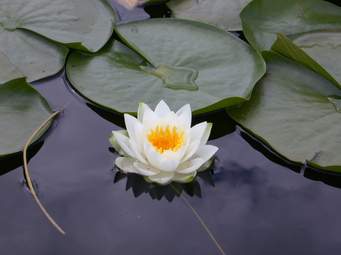Getting To Be(ing) Oneself

Who am I?
What do I want to do or be?
These are all questions that I have been busy with my whole life.
Wat kan ik voor de mensheid betekenen?
Was never a question that I bothered with.
Why would I want to ‘mean’ or ‘do something’ for mankind?
Mankind is a term for me that is an archetypal example of the ‘White Mind World’ operating, by defining everyone by describing them self. Man type literally.
That wasn’t and isn’t me, nor is it something I desire or wish to achieve. Female as bearer of and creator of life should be what, if either, defines humanity.
The only thing that men kind brought me was a distrust of my body, my thoughts and doubt of myself as having intrinsic value.
I can’t tell you who I am
I can’t tell you ‘what’ or ‘how’ it is to be big, physically, overtly gender attributable, black, 1.73 or any of the things that most people first react to. I can only tell you my experiences, my reactions or responses to those experienced reactions and the conclusions I have drawn from them.
Strangers tend to react to one’s appearance.
That is a great word, how you appear – to them. Which means that it is only an indicator of what people see and the conclusions they draw. Someone who is fat because they have dropsy or a thyroid issue will still be judged by many as greedy and lazy.
How do we find out who we are? One small aspect is being prepared to listen to and accept the judgements, opinions, wishes that others make? The acceptance is of the fact that judging is what people do rather than accepting someone’s judgement as a truth for anyone other than that person. How do we choose what to be or do? You make a point of learning who you are?
That quest has just about governed my life up to, around, including and beyond the moment
Since embracing the life philosophy of the teachings of Nichiren Daishonin.
Lots of things have become much clearer and a helluva lot easier since that time.
My function, the reason I was born – and by extension all of us, is to discover, accept and allow my unique talents, then find a way to live true to them and most importantly, to learn how to be happy (through doing this)*.
Nichiren posits a very specific kind of happiness – indestructible happiness, which is based on a solid life philosophy, in which wisdom and reality are fused within the
Individual allowing the Buddha state to manifest.
The attributes of the Buddha are; courage, compassion, wisdom, life force and joy. When the Buddha state is manifest, the attributes are unavoidable – I like all of the attributes.
The best thing about this philosophy is that the third part of the theme questions – that I never saw a need to recognise is also answered.
From this specific philosophical standpoint. I have the potential to be a Buddha, I am going to manifest that potential, the by-products of which are enlightenment, happiness, courage, compassion wisdom, life force and joy. By becoming happy and living true to myself, I give everyone around me permission (and a map) to do the same. Not only that, but with the Buddha’s attributes I have the ability to actively help all the people around me to achieve the same indestructible happiness.
About that, indestructible happiness is not the absence of problems, issues and challenges it is the knowledge that one can overcome anything that the universe might choose to throw in one’s direction.
And as for the asleep awake bit – I sleep when I need to and whenever I can, cos it’s nice to be able to sleep whenever one needs. As for the staying awake – Don’t you know that that is a recognised torture?
*People say “Well that’s all very well but what about the physcopaths and peoples who’s talent is in killing”
The point is that every single, human entity being has (inside them) the potential to be a Buddha
The principle of the 10 worlds was derived from the Lotus Sutra by the Great Chinese Buddhist teacher T’ien T’ai (538-597) most forms of Buddhism practised in Vietnam, Japan, China and Korea trace their roots back to his teachings, which in term reflect back to his own teacher Chih-I.
This succinct (and to me accurate and helpful) framework of the psychology of human behaviour states that everyone innately possesses ten life conditions or worlds through which they move from moment to moment. The six lower states – hell, hunger, anger, animality, rapture, tranquillity – will dominate unless conscious effort is made to enter the four higher worlds – learning, realisation, bodhisattva (compassion) and Buddha(hood).
It is important to realise that each of nine worlds has a positive and a negative aspect while Buddhahood, the highest state it is possible for a human to achieve is only positive.
How each of the worlds manifests depends on peoples ‘default’ setting, which are usually one of the four lowest worlds, as the fifth and sixth worlds (rapture and tranquillity) tend to be extremely transient. People move continuously through the worlds from moment to moment. In the six lower worlds we are at the mercy of our environment and circumstances (karma) our life condition changes in response to that external stimulus. A love letter brings rapture, bad weather can bring hell, a comment anger, the sight of another’s possession hunger etc.
The fact that we can move so swiftly between the worlds, which are all manifest within each other. meaning that it is as easy (or difficult) to move from a state of compassion to a state of hell as vise versa is called the mutual possession of the ten worlds
The Mutual Possession Of The 10 Worlds
Hell
A real understanding of this state can lead to the desire and wisdom to help others.
A state of suffering, illustrated by despair, depression and self destructive tendencies
Hunger
Yearning to improve things for oneself and others The desire to live and achieve goals;
Greed and/or an insatiable, unsatisfied desire for power, sex, money, material goods etc.
Animality
The instinct to survive; sleep, eat, make love and to protect and nurture life
Unthinking instinctive action, intimidating the weak, fearing the strong; selfish, pleasure seeking.
Anger
Passion to fight injustice and create a better world; a creative force for change
A state of self righteousness egotism, in which one cannot bear to lose. This state is a foundation of war.
Rapture
Intense pleasure and happiness; heightened awareness and feeling glad to be alive
Short lived happiness resulting from the achievements of desires. The wish for it’s continuance leads to excess (materialism) and a weak, dependent attitude of life.
Tranquility/Humanity
At peace, in control of desires; the ability to act with reason and humanity
A state of inactivity; unwillingness to tackle problems, leading to decline and negligence
Learning
Striving for self improvement by learning new concepts through studying the teachings of others. The foundation of realisation
The tendency to become self-centred, cut off from daily realities, or developing a dismissive attitude towards those with less knowledge.
Realisation
Wisdom and insight gained by the effort and effect of study and by observing the world
Self-absorption, lacking a broad view of life, arrogance (“I know better”)
Bodhisattva
Compassion and/or acting selflessly for other people, without expecting a reward.
Becoming a martyr neglecting oneself/health. Ultimately having pity or contempt for those one aims to help
Buddha
Wisdom, compassion courage, life force which illuminates the positive aspects the other nine worlds
Firstly, finally, quintessentially, the question(s), the focus, the locus of this philosophy; In Heli terms: “How and what others do is their business alone. How are you? That’s your business”
”As Minxy McNaughty always says: Share the joy!




